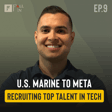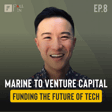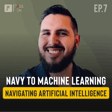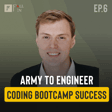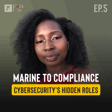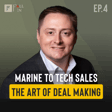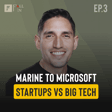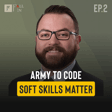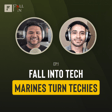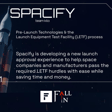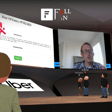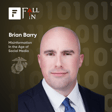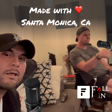Become a Creator today!Start creating today - Share your story with the world!
Start for free
00:00:00
00:00:01

Fall Into Tech #10: Jacqueline Blackburn - Navy EOD to Venture Capital
Navy Explosive Ordnance Disposal veteran Jacqueline Blackburn shares her journey from EOD to venture capital in this insightful episode. Discover:
- Jacqueline's career evolution from Navy EOD platoon commander to JP Morgan, and her transition into the world of venture capital at Decisive Point
- Insights into Decisive Point's unique approach, combining venture capital investments, advisory services, and accelerator programs
- The day-to-day realities of working at Decisive Point, including managing accelerator programs, advising clients, and evaluating potential investments
- Advice for veterans transitioning to civilian careers, emphasizing the importance of networking, understanding your new industry, and leveraging military experience
Whether you're a transitioning service member, aspiring entrepreneur, or curious about venture capital in the defense and energy sectors, this episode offers valuable insights into navigating the intersection of military experience, technology, and investment in cutting-edge defense and energy companies.
GUEST INFO:
- Jacqueline Blackburn LinkedIn
- Decisive Point (Venture capital firm that invests in dual-use technology startups and offers government contract consulting services)
EPISODE LINKS:
- The Quest Accelerator
- National Security Innovation Network
- NSIN Propel Maritime Digital Defense
- JP Morgan's Military & Veterans Affairs
- Radiant (Building micro nuclear reactors)
- Firestorm (Developing mission-adaptable aerial vehicles)
- ChatGPT
- DALL-E
PODCAST INFO:
- Podcast website: https://www.fallintotech.com/
- Youtube
- Apple Podcast
- Spotify
- Zencastr
SOCIAL MEDIA:
HOST INFO:
Transcript
Introduction to 'Follow into Tech' Podcast
00:00:06
fall_in
All right, welcome to the Follow into Tech podcast hosted by myself. I'm Jamil Mattin, and I'm here with Michael Rodriguez, we're two Marines turned techies. And on this podcast, we chat with fellow veterans about their journey from the military to the tech industry. um And this is in order to help you with your tech career.
00:00:27
Michael Rodriguez
Yeah, join in a weekly for guest interviews where you talk about tech, different types of roles to kind of just help you with your tech career.
Meet Jacqueline Blackburn
00:00:36
Michael Rodriguez
And today we're lucky enough to have Jacqueline Blackburn on. Jacqueline was a Navy explosive ordnance disposal platoon commander turned venture capitalist. Super interesting story. So excited to dig into that. Thank you again for joining us here today.
00:00:54
Jacqueline Blackburn
No, thank you so much for having me.
00:00:54
Michael Rodriguez
And yeah. And we always like to start off with a fun fact. So what's what's a fun fact about you, Jacqueline?
00:01:04
Jacqueline Blackburn
Yes, so I really love doing art in my free time. um As you can see in my background, I made 1000 cranes and displayed them here in my in my bedroom. um So I love working on like big art projects have always really been passion about it took a lot of after school art classes and grade school did a lot of like ceramics classes still do them here and in the city. um So yeah, one of my passions is art. So between going to museums and doing my own projects, I spend a lot of time doing that to, you know, really focus on those creative outlets.
00:01:42
Michael Rodriguez
It's pretty cool. Yeah, I was gonna ask about that looks super cool
00:01:47
Jacqueline Blackburn
Yeah, it's actually based off of this like Japanese proverb that you you get a wish granted if you make a thousand cranes. um So that's part of, that was part of the motivation for doing it.
00:02:00
Jacqueline Blackburn
It took me about three or four months to do. um And then I ended up like hanging them all up and it was like a fun, fun project and no paper cuts from that, which was very surprising.
00:02:12
Michael Rodriguez
ah the browser That might be the fun fact right there.
00:02:14
Jacqueline Blackburn
Yeah, exactly. Exactly.
00:02:16
fall_in
That's awesome. um That's great.
00:02:18
Jacqueline Blackburn
Yeah.
00:02:21
fall_in
um Why don't we dive into your military
Why Join the Navy?
00:02:23
fall_in
background? Could you tell us, um you know, why did you join and what made you want to join the Navy in particular?
00:02:32
Jacqueline Blackburn
Yeah, um so I guess it started back in grade school. I had, I rode the bus to school every day. So I had a really great friend and role model who was a couple years older than me. um And so she, you know, we grew up together. And as I watched her grow up, I saw her go to the Naval Academy. And that was really the first time I heard about and different service academies. and Service had always been really a large part of my life in general. um And, you know, I went to Catholic school and we, you know, would go to the soup kitchen, we would go during the holiday season, we would deliver gifts to folks. So it was always like giving back to the community was always something I was very passionate about.
00:03:19
Jacqueline Blackburn
um And so being able to see um you know a role in in the military where you're serving your country, you're serving something beyond a mission greater than yourself, um it was really interesting and intriguing to me. um And then you know I think At the Academy, you spend four years going to, you know, what is, it's not really college, but it's still your academic career for for to receive your Bachelor of Science degree. And um I don't think you truly understand the commitment you're about to make after those four years.
00:03:57
Jacqueline Blackburn
um Because you're so everyone's so young when they're going through the service academies and you're just trying to get through through to the next day. But um I think as it gets closer to graduation, you really start to see like what those next five years will look like for you, um which is that minimum commitment after the service academy.
00:04:18
Jacqueline Blackburn
time graduation. So I think like that was a real like defining moment for me of realizing like this was something I wanted to do and pursue.
00:04:29
Jacqueline Blackburn
um And it's been an incredible, it was an incredible experience, my time in service. So and yeah, I would say that would be you know motivation there.
00:04:38
fall_in
Really cool.
00:04:41
fall_in
um And as you're going through the Academy, do you get to choose? Because I haven't been through it, but I'm guessing you can choose your um branch of service that you want to um basically sign a contract with. um What made you want to do the Navy versus any other branch?
Choosing the Naval Academy
00:05:00
Jacqueline Blackburn
Yeah, so the different services um have different service academies. So there's the Air Force Academy, there's Coast Guard Academy, there's West Point, so the US Army, um there's Naval Academy, which is what I went to. um And I think when I was yeah applying to different service academies, when I went to visit Navy, it just really aligned. it's like when you walk through a campus, you're like this just makes sense, this is where I want to be. um i got to I got to do like a visit with, um so i I ran there all four years as a collegiate runner, um so i I did my official visit with a women's cross-country team, and I saw all these women doing, having incredible experiences, traveling the world, having these immense amount of opportunities, and I was like I want that for myself.
00:05:50
Jacqueline Blackburn
So I think that was really the reason I chose the Naval Academy versus West Point or Coast Guard or Air Force Academy. um And then during your time at the Academy, you spend your summer um going and doing different types of you know jobs and and and getting some experience as to what you want to do maybe.
00:06:11
Jacqueline Blackburn
after graduation um and that you go through this yeah this big process through what's called selection, or section um service selection rather. And um so you based off of like your class rank and based off of how well you perform, you get you know ranked and um then that helps like ultimately dictate what you're going to get service selected for. and There's certain like programs and um types of jobs that are more competitive than others. um So you can go to med school after their service academy and become a Navy doctor. You can go fly planes, but you have to have meet certain medical requirements. um For the special operations community, you have to go through like a physical screener. um So there's a lot of different types of requirements based off what you want to do after.
00:07:06
Jacqueline Blackburn
um But the summers allow you the opportunity to kind of shadow different roles in jobs, whether that's in the Marine Corps or um at a helo squadron or on a surface ship. So you really get a lot of exposure as to what type of job you want.
Becoming an EOD Tech
00:07:21
Jacqueline Blackburn
and i you know the thing that really enticed me to want to be an EOD tech and get into the special operations community was um the sense of mission and the sense of community. um And so when I got to shadow, so you have to go through a screener, and if you perform well in this physical screener, um you get to spend a summer shadowing at an EOD platoon. And so I spent my you know the summer going into my senior year with that EOD platoon and I really fell in love with the people and and what they were doing. um It was a really hard
00:07:57
Jacqueline Blackburn
um It was a really hard and you know position to service select just because it's very competitive. um And there's very few women that go into EOD. So I definitely had the odds against me, but I knew I wanted to do that. So I just put you know my mind and and and body into it and um so eight you know was was super lucky and fortunate to get selected.
00:08:24
fall_in
Yeah, that's awesome. I don't even know where to start because, you know, in the military, the EOD community is so highly respected. It's so dangerous. It's so rigorous to get into. And you're right, not very many women join. And you were saying it's because it's it was mostly because of the community um and um how they kind of carried themselves. So um really cool. What years were you in EOD?
00:08:51
Jacqueline Blackburn
Yeah, so I graduated the Naval Academy in 2013. And then you have to spend some time going through the training pipeline. So then I was down in dive school like immediately after graduation. So I spent six months at dive school.
00:09:06
Jacqueline Blackburn
They just started this new program where it was a longer pipeline for officers where you would learn surface supply diving, you would learn scuba diving, you would learn mark 16. So you'd learn all these different types of um and like diving rigs and then you would also um then go through EOD school, which is like almost a year, depending on what time of year you go, just because there's different breaks and such. And then there's an underwater phase to that EOD school, which is very unique to the Navy EOD community. um And then you go to jump school at Fort Benning, and then there's a bunch of other air operations courses you go through and some additional training. So that's about a two-year pipeline start to finish. um So I was all throughout kind of and
00:09:57
Jacqueline Blackburn
between Panama City, between Dustin, Georgia, so all over kind of the southeast part of of America. And then we're stationed up in Virginia Beach. And so I did two deployments um with two different mobile units. So my first mobile unit was mobile unit six. And then I went, walked right across the street to mobile unit 12 and did another deployment there.
EOD Tech Training and Deployment
00:10:22
Jacqueline Blackburn
um And so those were, you know, 12 month workup cycles, six month deployments,
00:10:27
Jacqueline Blackburn
Um, and then I got out in 2019, so almost seven years.
00:10:33
fall_in
It's incredible. It's very badass that you got to do all those different things.
00:10:37
Jacqueline Blackburn
Yeah, super, super fortunate.
00:10:37
fall_in
um
00:10:38
Jacqueline Blackburn
I like loved the people I worked with, particularly in Virginia. It's a very like close tight knit community, lots of families, and it's just, it was so wonderful to be stationed there.
00:10:50
Michael Rodriguez
I was also going to say that's a pretty bad ass and was going to kind of ask, um, just, you know, what would, what is for someone maybe listening and it's like, Hey, you know, EOD sounds interesting.
00:10:51
fall_in
Yeah.
00:11:03
Michael Rodriguez
What is, you know, kind of the daily life, you know, after a school and after jump school and after dive school, what are you and your unit actually doing, um, on a daily, weekly, monthly basis?
00:11:17
Jacqueline Blackburn
Yeah, so we spend a lot of time training, I think I was probably gone like 200 days out of the year, um during this work of cycles so whether you're, I mean and it's all really to train and become ready for when you go out and deploy.
00:11:33
Jacqueline Blackburn
downrange. So you spend a lot of time going to different schools, going to different, um you know, doing your own training, whether that's, you know, making sure that you're staying up to date on TTPs and procedures that are happening kind of in the AO, in the area of operation that you're going to be fully deployed in. um Definitely a little bit of admin work on the back end. um As an officer, you know, you have to um have you do reporting requirements you have to maintenance your gear and so there's a lot of different responsibilities you have within the platoon um and then
00:12:10
Jacqueline Blackburn
you know, that the time that you're not training, there is, you know, a little bit of grace period before you deploy. um And then you're on your six month deployment, and then you come back and you kind of rinse and repeat. um So it can be it can definitely be taxing for for folks, just because of the kind of that constant cycle.
00:12:31
Jacqueline Blackburn
um But it's it's really fun and you get to learn so so many cool interesting things outside of what you learn kind of fundamentally at school um during like those first two years of training. So um it's pretty neat to be able to kind of learn the different focus areas within the community. so you know As EOD techs, we are responsible for not only responding downrange for, say, a UXO call or an unexplored ordinance, traditional ordinance call, but also something maybe in the IED world or in the ChemBio world or in the nuclear space. So you do have to stay really up to date on those core competencies. And that can be a challenge because become you know you don't really become a master of any specific
00:13:19
Jacqueline Blackburn
type of um response, but you have to know all of them. So um that can be you know challenging and it's on its own, but it's it's very rewarding.
00:13:31
fall_in
Yeah, that's so cool. that's so cool um I'm kind of speechless here just because um you know you've been through a lot. and It's a lot of you know really high speed training. you um You've been deployed.
00:13:44
fall_in
um you know I can relate. yeah I was stationed in Virginia Beach for a little bit and got to train out there. um And you know in my platoon, I was part of an infantry unit where ah My team leader, um you know, stepped on an ID and lost his legs. And so can you talk about how you've seen the evolution of like the enemy using IDs and what are some things that we're doing to kind of prevent, um you know, what are some of the tactics and strategies that we're using in the field to kind of help ah shape um and combat such scenarios?
00:14:29
Jacqueline Blackburn
Yeah, absolutely. I mean, I think the war-fighting environment has changed drastically even since I've been in. um I do think that there is a huge emphasis on doing things remotely, whether that's through, um you know, having a forward look or recon look from, you know, a robot or ah depending really on like the threat assessment of the environment and and kind of the target or focus, um trying to do things as remote as possible to keep people safe.
00:14:59
Jacqueline Blackburn
which has always been something that I think will continue to exist and I also think too keeping like a close eye on what how the enemy is changing their own procedures and being able to quickly um respond to those and make adjustments to our own TTPs to keep everyone safe is super important. I still it's funny because one thing that I learned was from like even my my my chief and from some other more senior folks in the EODU community was never go, you know, take the same path you took um into an area. um And so I still employ that today, even in my own life where like, you know,
00:15:44
Jacqueline Blackburn
I think it's just kind of these things that you learn that be kind of like kind of like habitual that you even kind of employ and in your own life like for instance when I go to work I typically don't take the same path home that I took like I'll take a different train or do something different just to keep people keep other people that may or may not be watching like on edge or like not, you know, not always in the know of where I am. And I think that can be like, I mean, maybe that's an unhealthy practice, but it definitely is really important that like these TTPs do become
00:16:20
Jacqueline Blackburn
um ah like ah a practice and um or of like a lifestyle for for folks going down range. um But yeah, I mean, it's it's always evolving and it's always changing. And I think the biggest thing that we can do is like keeping a close eye on the enemy and how they're operating so that we can like defeat them or work in an offensive matter to to defeat them. So and yeah, I would say that's probably the biggest thing.
00:16:47
fall_in
Well said.
Transitioning from Military to Civilian Life
00:16:48
fall_in
um what What made you or I guess could you tell us what were the best and worst parts of your time of service?
00:16:57
Jacqueline Blackburn
I would say the best parts were definitely the teams and the people I worked with. um I think it's it's really hard. It was really hard getting out um because I think the military makes it really easy to have a team and have a sense of mission um without like that that just being a given, right? Whereas like when you're now in the real world, you have to find go out and find that and that can be like,
00:17:25
Jacqueline Blackburn
really eye opening for folks that like have never really had to do that. um So that I would say the people is definitely the best part of my military career. um I think the worst part was realizing that I wasn't always going to be able to be operational as an officer and that there is a lot of politics and bureaucratic systems and processes can be really slow like to get any change done takes so much time and effort and even when that does happen sometimes there's still no change um so I think that's kind of one of the reasons why I got out um but to like I think
00:18:05
Jacqueline Blackburn
people, i I don't think that's like, I don't think I'm the only one that thinks that and I wish there were better processes in place to help enable change faster. And that would be probably like one of my biggest frustrations about um being in the military.
00:18:23
fall_in
Yeah, it makes sense. And so because you weren't operational and um as I guess you were leveling up as an officer, um kind of oh it sounds like you were getting away from the field and operations is kind of what led you to get out.
00:18:42
Jacqueline Blackburn
Yeah, absolutely, it was. And I think like, you know, as no, you really only have a couple, you can only really do like two deployments with a platoon before you then go sit in the op shop or you have a Pentagon or, you know, you're an admiral's aide, right? So I think that for me, it was that like, you know, decision point of, do I want to groom myself to command and stay in for 20? Or is like now that that a time to just go out and explore what it is that I can do in the civilian world. So I ended up taking the leap of faith and um it was really challenging the first two years. I i know my sisters just also just got out this year um and I'm
00:19:27
Jacqueline Blackburn
reminded when I talked to her of some of the challenges like I faced and remember facing getting out because you don't have that team that mission anymore so you really and also too I felt like the military really I i definitely felt like the military defined me as a person for my career and who I was and when i went when I got out, it was like who I had to like rediscover who I am and what I like to do. And um I wear, you know, they're closed now, I don't wear a uniform, like there's different types of self-expression. And so I think like I had a lot to learn about myself when I got out that I didn't really realize. um Because it's really easy to like fall into place, be in a uniform, do what you're told and, you know, go out and do your operations or, um you know,
00:20:19
Jacqueline Blackburn
And I think it you know sometimes you get trapped in that kind of environment and that's just your identity. um And so for me, there was a lot of kind of just like self-learning, but also figuring out what I wanted to do now that I was out and like how I was going to make an impact really.
00:20:38
Michael Rodriguez
Yeah, I think that's ah important to share because I think people underestimate the lack of mission and lack of purpose when you get out because sometimes when you're getting out, you're so ready to get out that you're like, you know, everything's gonna be awesome and everything's gonna be great. And you know, it can definitely be that but it is a big change and you know, a lot of time military you're hanging out with your friends at work like you're kind of close to everyone and like you all kind of think the same way and do the same thing versus you go to civilian world and you know never see the people outside of work or you have very different thought processes on things. So I think that is definitely um something to consider and to plan for when you're getting out of what is
Entering the Tech Field
00:21:23
Michael Rodriguez
the next mission? What is the but defines me? Because you usually know when you're in like, well, I'm Navy special operations, right? like
00:21:29
Michael Rodriguez
You say that and you everyone knows what that is. Like that's badass um versus now it's like, well, I don't know what that civilian role is, right?
00:21:32
Jacqueline Blackburn
yeah
00:21:37
Michael Rodriguez
What does that mean? um So it can definitely be a big change. And I'm curious what led you to kind of go down the road of tech or technology um versus I don't even know what all the options are out there for eo former eo former EOD, but I'm sure there's some interesting opportunities out there for that.
00:22:00
Jacqueline Blackburn
Yeah. Yeah. So when I got out, I was like, I want a clean break. I didn't want to go into the reserves. I felt like that was just kind of like. half-assing a job and I, and not like to to no one, like for folks that do you want to do that, that that that's fine, like we want to be in the service, that's fine. For me, I just like wanted to just a full clean break. um And so I moved to New York. I had done all of my pre-med, pre-reqs for medical school. So I had plans and intentions of going to Columbia and starting
00:22:32
Jacqueline Blackburn
medical program there. So I did my first semester. um And I realized that being a doctor is not what I wanted, what I thought I wanted to do. um And so I ended up kind of exploring around and reaching out to a number of veterans, reaching out to my family and friends and figuring out like what it is I wanted to do. But I also realized I had to pay rent and i had to like have a job.
00:22:58
Jacqueline Blackburn
Um, so I ended up, you know, applying to a bunch of different companies and learning about venture and, and, um, I was, I became really interested particularly in tech and the way it, like the type of impact it was having and how quickly things were evolving and changing. And I think that's what like initially drew me in was like, wow, this change is happening so quickly. It's so different than what I'm used to, right? And this like bureaucratic system I played,
00:23:25
Jacqueline Blackburn
in for, you know, the past seven years. So I really liked how quickly um tech moved and how much of an impact it could have um on society. And um so I ended up, but I also like to my point earlier, I need to to find a job. So I worked at, um I also like didn't really have a lot of like a big finance background, I didn't get my MBA. So um I was like, I'm going to go work at JP Morgan, because they have a great military transition program, I can figure out what type of finance I want to work in. um I can figure out, you know, whether the finance is even for me. um So they, I did that for two years. And I
00:24:07
Jacqueline Blackburn
You know, when I was going through the program, you have the opportunity to really self-select what, you know, ah what type of internship you want to have. um And so I did a bunch of research, found out that there was a team in kind of the venture landscape that was doing venture debt.
00:24:23
Jacqueline Blackburn
um They were, you know, four senior MDs that were brought over from SVB to build out this venture debt portfolio to really help companies um not feel so scared about going to JP Morgan that were early stage. and Because when you think about JP Morgan, traditionally you think, oh, they're, you know, it's a company engagement starts at like the IPO level, right? When they're, you know, well into, you know, later stage.
00:24:48
Jacqueline Blackburn
and and have you know significant traction and all of that. So this venture debt portfolio was really hoping to get you know more interest kind of earlier stage for companies so to build that relationship sooner rather than later um so that they weren't just you know creating that relationship 24 months before they IPO'd. So I did that, and I ended up you know reaching out to those senior MDs. They brought me into the team. I did feel like, to your point earlier, about different startup fields in like kind of a large organization, it felt like a startup.
00:25:24
Jacqueline Blackburn
um within JP Morgan because it was a small team we were really close it was like right around COVID so like everyone was virtual but we were talking every day and um so that was that was awesome experience to get not only you know their experience and and be able to kind of learn from them but also just like understand the way a large organization like JP Morgan works and operates and how everything's connected and really helped demystify that for the early stage companies we worked with. um So I did that for two years and then I realized that I really wanted to get into the investing side. um But I didn't really know how because, um well, one, it's really difficult for any any person to get an adventure.
00:26:09
Jacqueline Blackburn
um But secondly, like I hadn't built a business. I didn't come from an investing background. um So i didn't the only real experience i could I had was my operational experience. right So you know there were a couple different VCs that were investing in defense tech companies. um And so I reached out to a number of those um And um I worked at a firm called Scout Ventures for a couple months and then transitioned into, just as a point where I am today. um And so we focus on early stage investing at that, you know, seed series A stage.
00:26:49
Jacqueline Blackburn
um across the the sectors of defense, energy, and infrastructure. So a lot of really nice natural alignment to what I did previously in the military, but being able to kind of bring tech and innovation into the hands of stakeholders quicker and faster through some of the technologies that we're seeing on in the private side.
00:27:12
Michael Rodriguez
Nice. Yeah, let's, I guess, deep dive into some more of that and specifically how I can get money from
JP Morgan Military Pathways Program
00:27:20
Michael Rodriguez
you guys. um So for the program at JP Morgan, just to kind of start from the beginning, you mentioned it was a military or so a military to JP Morgan type program.
00:27:34
Michael Rodriguez
Do you know the name of that program or how listeners can get in?
00:27:35
Jacqueline Blackburn
Yeah, it's yeah yeah so it's called the military pathway is military pathways transition program I think our military pathways I think is what's called um formally, um but I'm happy if for for anyone that's interested I'm happy to kind of connect you directly to this.
00:27:53
Jacqueline Blackburn
the program manager. But and I know they typically go to job fairs, but it is a program kind of built within um the veteran affairs community within JP Morgan. So um I think that would probably be a good like starting point. um And then you can apply they have different cycles um in which there's job descriptions open for those roles. And they have different roles throughout the country. It's usually, um I don't know if it's changed and since I've been in, but typically it's about like eight to 10 military veterans that are in the program. um And I believe they do them twice a year um where they bring in kind of new um veteran cohorts.
00:28:41
Jacqueline Blackburn
and And then the program itself last two years. So after the end of those two years, the intention is that you, you know, have gotten enough experience at JP to figure out what it is you want, you know, where you want to be permanently in a role and you can and transition out of the program early, if you find the role, they just give you that full two years to figure out what you want. So for my first year, after the end of my first year, you can transition to another role. And I ended up kind of transitioning into a permanent role because I really liked the yeah space I was in.
00:29:18
Michael Rodriguez
Awesome. And um for that, is it open to kind of any military background? You just apply and...
00:29:24
Jacqueline Blackburn
Yeah, I don't think there's any like um specific things that would preclude you from applying as a military veteran, but I do think you can, I think there's a limit to like how, when you can apply if you've been out for like more than a year or more than two years. I do think there is some sort of condition there. I'm not entirely sure, but I think that would be the only thing um in terms of like your military background.
00:29:52
Michael Rodriguez
Gotcha, that makes sense, yeah.
00:29:53
Jacqueline Blackburn
I think it's two years. You have to have been out like no more than two years.
00:29:58
Michael Rodriguez
Okay, gotcha. um And then for that role, so you said it's kind of a two-year jump around the bank, get to experience a lot of different things, learn from people, and then figure out the role you want to get into. You went into ah this role helping Kind of JP talked to startups and work with them.
00:30:24
Michael Rodriguez
Can you walk us through? You know what you actually did on a daily basis for that and what you what your communication is with with the startups what kind of startups you work with um You know how I can get in to get more money from them as well, you know, it's a key point here But yeah, can you swap us to that?
00:30:39
Jacqueline Blackburn
Yeah, no. Yeah, absolutely. So, um, there were a lot of different relationships. They were both on the credit side. So if companies had just raised capital and wanted to get venture debt, we would go through that process. Um, and so that was kind of the credit side. And then the treasury side, if companies wanted to become a client of JP Morgan, um, they wanted to like do their banking with us. There's you know specific products that we would offer them.
00:31:07
Jacqueline Blackburn
um and help them manage their their finances. um And so, you know, I kind of played on both um both sides there. So I would, you know, not only diligence companies that were looking to get funding um in the in terms of like rent or debt, and then also looking to bring in new clients and to help them, you know, have a good banking solution for their business. um And so we worked with a number of different companies. And I actually, I really enjoy, like when I got out, I was like, I i really want a clean break from the military. And so getting to work at JP Morgan allowed me to kind of
00:31:49
Jacqueline Blackburn
work with so many different types of companies that were like, had no applications to the defense community, right, some of them, right. And so it was like really nice to get that exposure to just work with people that don't have any military background that, you know,
00:32:04
Jacqueline Blackburn
don't know any like different types of capabilities needed or or whatnot. So um I worked with you know FinTech companies. We worked with consumer companies. We worked with like traditional B2B SaaS companies. um So depending on you know the business model, we would help them kind of establish their bank accounts and and get them all set up. So it was kind of a hybrid approach and then would also help some of the clients we worked with in with introductions to other parts of the bank, whether you know they wanted to do a private placement and or they wanted to go IPO, making sure that they got the right intros and the and and the warm intros into the different parts of the bank. So whatever
00:32:47
Jacqueline Blackburn
you know whatever they needed, it really depended on on the client, but whatever they needed from us as as their bank, we would you know provide. um We also did a lot of like networking engagement with other VCs, with other startups, because we were building out this practice, right? So we had different pilot cities. I was based in New York City, so I spent a lot of my time getting to know the ecosystem. i you know part of this is not only you know bringing clients but also educating startups about what does a good like finance strategy look for you? What what does a good HR benefit, sorry, um employee benefits look like for you and and having different programs in place um to help the business.
00:33:37
Jacqueline Blackburn
and And then also just like different market assessments and how do we help these companies stay informed of what we're seeing um in in kind of the broader macroeconomic environment as well.
00:33:53
Michael Rodriguez
Gotcha. And then yeah, that kind of perfectly transitioned you into, you know, VC land, if you will.
Entering Venture Capital
00:34:00
Michael Rodriguez
um Can you talk to us about because this is, we just recently had Eric Schuan who introduced us, um also VC who I knew from the Marine Corps. And it's interesting to ask, like, how do you get into VC if you are let's say Fresh out of the military. Can you can you even get into VC or how does one go about getting into the role?
00:34:24
Jacqueline Blackburn
Yeah, I mean, it's definitely possible. So I actually have a number of friends that have interned at VCs and then been offered roles afterwards. So Skillbridge, for instance, is a great program, right? You can really pick whatever role that you want to to um take for those that extended period of time. I can't remember if it's like three or six months.
00:34:48
Jacqueline Blackburn
um But you know on the back end, do you have the opportunity to potentially you know get hired into wherever you intern. um So there's programs like that that can get you in the door there. um For me, it was I built a lot of relationship. i'm like I was really big into the network game um because I think a lot of VCs like who you know,
00:35:11
Jacqueline Blackburn
like all of your connections. um And for me I just wanted to learn as much about the community and the different types of people and how they all kind of played together um in that environment. So that was how I got kind of involved in the VC community more more wholeheartedly. It was really just like going to networking events, going to different you know types of in-person events that allowed me to just meet more people. That's actually how I met Eric, was like at a networking event. It was actually like one of my first VC networking events when I met Eric. And then we just continued to engage regularly. right like We met for coffee. We you know actually really became really good friends, too. um ah Even outside, we were both part of a smaller like group of kind of what we call new VCs, which is an organization
00:36:04
Jacqueline Blackburn
kind of that um one of our friends started, and there's like 300 investors that are like new to VC, you know, and we do ski trips, we go, you know, out to the Hamptons together, we've done, you know, even just like Friday night dinners. um So it's a nice little, we do like game night, you know, it's a nice little community of people. And so as that continues to grow, like,
00:36:26
Jacqueline Blackburn
My network continues to go and um so that's really how you get connected is just meeting people and then figuring out what roles are available and also I think to like a big thing is figuring out what type of VC you want to work in. um like What type of investments are they making? Is it a thesis that ah really aligns with your own mission? Do you like the team? What type of work environment? Is it in-person? Is it hybrid? like These are all things to consider. And I think you can really narrow it down. Unlike other types of like finance um finance jobs,
00:37:05
Jacqueline Blackburn
you can really narrow down what it is you like and what you don't like and really pick the VCs that you want to work with. right Because you have have different categories of VCs. You know you have your blue chip VCs that are large. and kind of they They play a lot like PE firms, quite free right frankly. um And then you have kind of the smaller funds. You have you know defense-focused funds, you have climate-focused funds, you have consumer-focused funds, you can really like pinpoint what you want. um And then it's just like finding the right team that you want to build with. um And so I did a lot of research there to figure out what it is that I wanted and what I cared about.
00:37:50
Michael Rodriguez
Gotcha. Yeah. So sounds like he is definitely networking, going to some of these events. Shout out to Eric for helping to get on this prestigious podcast here. um And for these meetups, right? That's one thing I've been trying to figure out here as well, North Carolina, as I try to get more um into the startup scene, if you will, of where do you find these events? How do you know which events to go to or who to talk to? Can you kind of talk about how you found these events?
00:38:19
Jacqueline Blackburn
Yeah, I think it starts with like getting to know people just kind of in the ecosystem. And then whether that's like signing up for different organizations, maybe like it's a, you know, a co-working environment, they send out a a weekly newsletter of like their happy hours right or whatever events they're doing and just going to those. I'm like not really an outgoing person. into like I'm a very introverted person, so it was really hard for me at first to like be so extroverted because that is like really the nature of our job, is like talking to people, going to see people.
00:38:56
Jacqueline Blackburn
and meeting founders and and all of that. So for me, that was like definitely challenging, but I think it starts with just you know meeting a couple people, figuring out the the ecosystem, getting on some of the newsletters and engagement. um And then from there, it just kind of continues to grow. right um And I think that you know as you learn more about the ecosystem, you realize what are the events I want to be at versus the ones I can skip.
00:39:26
Jacqueline Blackburn
And it's really easy in New York, because there's always an event going on, um where I do think it is probably challenging in other areas, finding those communities in those niche, there's like niche kind of environments. But yeah, I mean, it's, they do exist, you just kind of have to go out and find them and you can find them. i You know, I know a number of folks will post things on Luma or Partyful or Eventbrite. um So those are great kind of resources um to look for different events. um There's a ton of accelerator programs um and they'll have demo days and that'll bring in folks from, you know, the startup community, the investor community. So you ah if you go to those kind of larger conferences or larger larger events, you might be able to establish a broader network. of people, not only startups, but maybe some investors you want to meet um so you can really broaden your own network and at some of those larger conferences. and i I remember going to a lot of kind of the larger events just because I didn't know anyone when I first started. and Now that I'm kind of a couple years into this, I really enjoyed the more like smaller, intimate conversations and dinners. and
00:40:39
Jacqueline Blackburn
I know the things that like I want to go to and have a better sense of and time management in terms of like what I want to achieve out of going to a networking event.
00:40:49
Michael Rodriguez
Awesome. Yeah, that's great insight. And I guess before we jump into, you know, what is a VC and all that, the startup scene you kind of mentioned in New York City, it's pretty well known to be good. But everyone really talks about San Francisco, right? um As the the best startup scene, um kind of where the most innovations happening. With your experiences, and is New York just as um exciting as people make San Francisco sound?
00:41:21
Jacqueline Blackburn
i I really like New York. I think New York is very unique because you have the the most talented people in any industry here, right? Like you can be walking down the street and be, you know, talking to, seeing see an artist and then see like a financier, right? um Whereas I do think there is a bit of homogenous environment in in so in a place like Silicon Valley where like there's just a lot of tech. um So i I think that's really unique about New York is that you have this really colorful ecosystem of people that are doing
00:41:57
Jacqueline Blackburn
a lot of different things very well. right um Not only is it the finance capital, but it's also a great place. like You have FIT down the industry, you have um so much like different types of industry kind of here centrally located.
00:42:14
Jacqueline Blackburn
Um, so I think that draws in a lot of really unique talent. Um, and there's just also just a lot of people here. Um, and so I think you get a real sense of, um, kind of diversity of thought of kind of, um, just, yeah, think like a thought and and of kind of culture. And I think that's, that's really cool.
00:42:35
Jacqueline Blackburn
um I will say, though, that you know a lot of people think that if you're not in Boston, if you're not in New York City, if you're not in Austin, if you're not in SF, that like you have no you no business building something. And I think you can build something successful anywhere you live.
00:42:56
Jacqueline Blackburn
Um, and I think it's about having the right strategic partners, building the right team and culture and building a solution that has great impact. Um, so I don't think like, you know, you have to be a founder and live in a top city where there is kind of cap, like a lot of capital. Um, I think you just need to build a really good product with a really good team.
00:43:17
Jacqueline Blackburn
Um, I think that will go much further than like where you are situationally. Um, but for me, like I've really enjoyed New York. I've gotten comfortable living in a city. And, um, I do think from like a networking perspective, it's really helped me, um, kind of grow and figure out the the ecosystem within VC.
00:43:40
Michael Rodriguez
Yeah, that's good to hear. there's There's hope for me over here in Charlotte, North Carolina. um So we'll see about some of those meetups. And now I guess diving into kind of the role now, if you were explaining to someone who's EOD in the Navy, doesn't know, never heard of VC, like what, how would you describe the role of venture capitalists?
Role of Decisive Point as a VC Firm
00:44:06
Jacqueline Blackburn
Yeah, so well, first of all, I will make a note. So decisive point is more than just a venture capital firm or first and foremost a venture capital firm. So we make investments.
00:44:16
Jacqueline Blackburn
um with, you know, out of a fund when the fund is composed of um capital from our limited partners. um And so that capital is then deployed into early stage businesses, businesses that are just beginning um to gain customer attraction, to pilot, to sell their product, to go to market.
00:44:41
Jacqueline Blackburn
um with their product. And so we help these companies and you know with with our capital that we you know deploy out of the fund. um And um we help them in a very unique way that a lot of VCs and maybe maybe don't focus on. um And that's we try to really work with teams that we invest in and help them with their government contracting. So sell their bit sell their their technology into the hands of government stakeholders.
00:45:15
Jacqueline Blackburn
and war fighters today. um And so you know with that, we've been able to you know help these teams in a very significant way achieve and capture non-dilutive funding to help them grow their business. So for every dollar we've committed out of the fund, we've been able to return to our investments on average about $20 of non-dilutive funding. And they can be in the form of traditional SBIR contracts, other transaction authorities,
00:45:41
Jacqueline Blackburn
um or even things like you know working with a lobbyist or major appropriations or programs of record all of that um kind of as they kind of progress with their government engagement um so that's kind of the first piece of the fund, of the firm. um We also run an advisory business. So outside the Sculpa venture, we work with companies on kind of that, you know, six, nine month contract and we help them with their government business. So, you know, we lay out a strategy of approach for them. We provide kind of, these are these concrete deliverables we're going to help you with so you can grow your business. And really the the the goal of working with our advisory clients and even our our venture
00:46:24
Jacqueline Blackburn
um portfolio, is that they eventually outgrow us. right They get their own full-time GovBD person to help them leave their business, and they don't need us as much. We're there in the initial to get them set up and to get them established, and then they kind of spread their wings and flourish and can kind of do it on their own.
00:46:46
Jacqueline Blackburn
um And then the third thing we do is we run a number of accelerator programs. So we work across different federal agencies, whether that's different state agencies, the Department of Energy, Department of Defense, and we run, you know, 14 week, 10 week cohorts with, you know, 10 to 12 companies.
00:47:05
Jacqueline Blackburn
and we help them build foundational knowledge of working with the government. And so we'll work with companies as early as like, i I'm just registering on sam.gov and I don't know anything about selling to the government. I've never submitted at SBIR phase one before. Two, you know I'm trying to transition my phase three. I'm trying to engage with um programs of record. I need help um getting additional stakeholders involved.
00:47:31
Jacqueline Blackburn
um to show them my technology capabilities. um So that also provides a really great, not only dealful for us on the investment or advisory side, but just another way that we can work with different um agencies within government to help bring technology um faster and to help kind of create levels of um of um of defense and deterrence against our enemies today.
00:48:03
Michael Rodriguez
Well, yeah, that sounds like Decisive Point has a lot of interesting different roles you can kind of be in. It's not just one set of things, a lot of different options there.
00:48:16
Michael Rodriguez
Can you, again, with the different options, this will vary a lot, but for your specific role, can you kind of talk through what a day looks like for someone who may be interested in getting into something like this, like the team, what you do?
00:48:31
Jacqueline Blackburn
Yeah, yeah, absolutely. So um I would say my role is, um I think all of our roles are are pretty unique at a decisive point. and we We kind of play in and a lot of these different business lines. um So for me, I spend about 50 to 70% of my day working in in the accelerators. So we right now, I'm managing five different accelerator programs.
00:48:56
Jacqueline Blackburn
um and kind of the day-to-day operations there. And obviously do that with um other ah parts of my of the team. um And so that's really, it's awesome getting to work with people that you enjoy being with. And um so it's definitely it's definitely a lot of work, but it's not as much of you know work when you get to do it with people you like.
00:49:17
Jacqueline Blackburn
um And so I spend, you know, like I said, about 70%, 50% of my day doing that. And then I also have a couple of clients on the advisory side, so I engage with them um on, you know, sometimes a weekly basis and helping them submit proposals and um working with them on kind of that contracting strategy. um And then I also talked to a lot of founders as we're looking to make investments um and also engage from you know portfolio management side, making sure that you know if theyre we have companies in our portfolio that are fundraising, who can I connect them with to help them raise additional funding? and
00:49:54
Jacqueline Blackburn
how, do you know, they want to get access to a certain customer, right? How do I help bridge that and create that warm intro there? um So, you know, we not only do I get to like manage how, you know, and help manage their portfolio, but I also get to listen to a lot of news and upcoming startups in their pitch presentations. So and it's fun to be able to do a couple different things within the firm and not just be kind of siloed into one business line.
00:50:26
Jacqueline Blackburn
and And I also think a lot of there's a lot of overlap. right So if I'm you know learning or reading about an experimentation event that you know we communicate to one of our cohort teams, um you know if that that same experimentation applies to an advisory client or to you know a portfolio company, I can share that. And and it really kind of like feeds naturally into some of these other businesses.
00:50:53
Jacqueline Blackburn
um And so, yeah, that that that seems to be pretty rewarding. And um it's interesting because I never had like an acquisition background. um When I was in the military, obviously, like,
00:51:07
Jacqueline Blackburn
like 100% operational. So it's been a huge learning curve to realize how difficult it is to work with the government. Not surprising, though, but it is very difficult. And I have an incredible team, that you know, one of our um senior partners, and he and spent 10 years managing the Aegis Weapon Systems budget, which is a multi-billion dollar budget for the US Navy. So like backgrounds like that of the team members I work with is incredible because they have so much knowledge and are just like so sped up on how these things work. So I've learned so much. And I think that's what keeps me enjoying the role is that I feel like I'm constantly learning. There's constantly something I
00:51:49
Jacqueline Blackburn
I don't know and I want to know. um So I think that like curiosity and that engagement has been really helpful and has kept me really motivated, particularly like at this point.
A Day in Venture Capital
00:52:01
Michael Rodriguez
Yeah. And I mean, tech moves so fast and there's so many different things going on that I feel like, you know, if you're interested and you're curious, there's just so much out there that you just never run out of things to explore, if you will.
00:52:15
Jacqueline Blackburn
Yeah, yeah, truly. And I also think like, this probably applies to a lot of folks in the VC community, I don't think you really have a typical day. um And I think it for someone that doesn't want kind of a routine or like, kind of a, you know, consistently, like kind of the same thing every day, VC is a great opportunity for you to to yeah not have that. um And you're talking to a lot of different technologies companies, you're talking to a lot of different people and networking with different people. So I think it's it ah definitely keeps your curiosity. um But like I said, you have to kind of be used to not having and the same routine every day.
00:53:04
Michael Rodriguez
Gotcha. And, you know, something that's always found interesting was I know you are, like you just mentioned, you're working with the accelerators, you're working with kind of advisory roles and stuff. But for, you know, that kind of role, or, you know, venture capital, trying to go find startups,
00:53:21
Michael Rodriguez
One, how are you evaluated? Because I feel like it's specifically if you're just trying to go find startups, you know, it could take 10 years for you know one of those companies to be successful or not successful. How are VCs evaluated?
00:53:36
Michael Rodriguez
um Yeah, I guess that's really the question.
00:53:39
Jacqueline Blackburn
um Is the question like how are they evaluate from a company perspective or like how am I evaluated at the firm?
00:53:47
Michael Rodriguez
at the firm as far as like, let's say you're new into the company and you want to you know be successful or get promoted. um you know How are you evaluated to know if you're good or bad when you know some of these companies take so long to know if they're good or bad?
00:54:03
Jacqueline Blackburn
Yeah, um so I would say I'm very lucky because I work with an incredibly like organized and professional boss um who has given me kind of KPIs or key performance um metrics to ah try and achieve right during my time at decisive points. So it's like very clearly outlined. you know like If you do this, you're going to get to the next yeah know phase. right So I think, in essence, you know without giving out like the specific KPIs, I think what you know what makes sense for me is if you're not getting clear guidance as to like how you achieve the next milestone whatever job you're doing you definitely should be getting that. um So that would be like my first recommendation is that if you're not if it's if it isn't clear what like will get you promoted to the next role or get you like you know
00:54:55
Jacqueline Blackburn
increase your pay or or whatever, um then you probably need to figure out what that is for you. Because every role is going to be different. Every organization is going to function differently. um And it needs to be like very transparent to you as an employee. And um so I would say like that'd probably be like my biggest piece of advice. And I also think, too, like having a good work ethic, which I feel like is self-explanatory. But like staying motivated, you know I think typically,
00:55:23
Jacqueline Blackburn
in in the VC world, you want to be able to um understand not only the nuances between the different terminology, the different financial models, and um the different without like hard skill sets that you need to be successful, but also being able to leverage networks, being able to bring in the right deals that you know go through selection committee and you know um help with yeah or that ultimately get invested in out of the of the fund. um And then I also think, too, there is, you know, VCs also have to fundraise themselves. So bringing being able to bring in capital to help support that next fundraise is also really helpful and helps you kind of
00:56:08
Jacqueline Blackburn
gain additional credibility within the firm. But it really depends on, like I said, on the firm and and what you know how they define success and what you know a partner looks like. you know Someone that's a principal, maybe like ah the equivalent of a principal, maybe be like a senior analyst at another firm. right So it really depends on like how the structure is. But I i would highly recommend that you know within like the first six months, you should be given KPIs to achieve to that next milestone. And if you're not, you know maybe that's not the right organization for you.
00:56:46
Michael Rodriguez
Yeah, no, I think that's probably better advice than just saying specifically how you're evaluated because it does differ so much. And that kind of translates to that really any role. um So yeah, that's a good advice.
00:56:57
Jacqueline Blackburn
Yeah.
00:56:59
fall_in
I want to go back to your firm. what um What do you think initially drew you to Decisive Points mission?
00:57:07
Jacqueline Blackburn
Yeah, I mean I think that I ultimately realized that um while I loved my time working with different founders and and different startups um at JP Morgan, I felt like very mission aligned with working kind of back in the defense space. I also really liked the fact that I could talk to founders and could give my feedback as to whether a technology would be a realistic capability for folks down range since I had that experience. And that felt very natural.
00:57:42
Jacqueline Blackburn
um And then I think, too, just, you know, when I when i did, and, ah you know, when I was thinking about joining the SISA Point team, I did get to meet the team and just really connected with the people that work there. I think what but builds a strong culture is people that are really invested in the mission and are all on the same page. And I feel like that exists at the SISA Point in a very meaningful way.
00:58:11
Jacqueline Blackburn
um people don't stay around if they don't believe in the mission. um And so I think that kind of a combination of those things is what drew me into a firm like Decisive Point. And and I like being able to talk to companies and and be valuable and be helpful. And I think for the first year when I was there, it was a lot of it was a lot more learning than I was helping. it And I think even earlier this summer, I had like a lot of like Small moments or small wins where I was talking to a company and realizing like how much I was helping them And I like was it I was like well I am like I am can actually be really helpful You know and I think like you have those little Realizations, but it does take time being in a new role to figure out how to be helpful or how to be most helpful um to companies um But yeah
00:59:05
fall_in
So as you're talking to these companies, um especially at the early stage, how do you um identify promising and it sounds like you're in the deep tech or it's like a deep tech firm. So how do you identify promising startups?
00:59:22
Jacqueline Blackburn
Yeah, so we look at three big things, I would say, and keep it super easy. um Do we like the team? Do we like the tech? And do we like the deal, right? So the deal has to make sense from a financial perspective, because at the end of the day, we we have the fiduciary responsibility to return capital and some to our investors, right?
00:59:40
Jacqueline Blackburn
um and to have those sizable returns. like That's why people are arresting us. um So that would be like step one. like The deal has to make sense, and there's a lot of deals that we love. but lot There's a lot of companies that we love that the deal we don't love, so it gets it hard. But the nice thing about it is that we have different ways that we can work with them, whether they become an advisor client or whether they participate in one of our accelerator companies. so It's nice to kind of be able to leverage those other business elements. and But yeah, and then the team, obviously the team, it has to make sense, right? um I think that's probably the second most important thing. um I would say even sometimes a team is more important than the technology because
01:00:21
Jacqueline Blackburn
You can have some really great technology, but a really crappy team and that can be really challenging. um And ah so I think team is really important. And then obviously the tech has have a broad and wide impact, right? And we have to be able to see it a align um within kind of the um federal government in some capacity, right? Like either it aligns with some capability or error requirement um that has funding, right? Lines to to that capability set. um So we do a lot of diligence there as well um before we make an investment.
01:01:01
fall_in
Totally. um Can you talk about some of the more exciting tech that you are not even tech, but just innovation in general that you've seen recently?
01:01:11
Jacqueline Blackburn
Yeah, so we are we invest in a company called radiant, which and they're building micro nuclear reactors. And so I think from an energy perspective, that's been super exciting to so to watch um because they're actually going through the nuclear regulatory commission process. um And that really hasn't been done since the 60s. And I think we're starting to see a complete revolution about how people think about nuclear energy. um And then it's not as scary as ever everyone thinks. And so I think that's been really cool to see evolve. And I think there's a lot going on in kind of the autonomy space.
01:01:52
Jacqueline Blackburn
whether that's like remote ATVs um that, you know, can be modular and, you know, have different, meet different mission capabilities, um doing things in really a decentralized way, like we're investors in a company called Firestorm, and basically they, you know, can ship a connex box anywhere in the world, and have it placed on site,
01:02:14
Jacqueline Blackburn
And then within that Connex box, there's 3D printer set up and a whole process laid out for building a tradable drones, right? That can have you know meet different mission capabilities um and can you know you can have a whole army of these tradable systems within you know six hours, right? And built and ready to deploy. And they you know have storming capabilities. And so there's a lot of different you know, focuses that it can have depending on the particular type of mission and target. and So I think that's really cool because, you know, you're doing it in this really decentralized fashion and um you're able to do it kind of at the edge. So right, you know, next to where, you know, people are, are, um you know, war fighting. um And then
01:03:06
Jacqueline Blackburn
Um, I also think too, um, there's a lot in the AI space. I feel like that is like the buzzword of the century here. Um, but I do think that like, I mean, I even use, I mean, I check use chat GPT all the time. Um, it's definitely, I think you'd be lying to yourself. Um, if you said that it didn't and affect you every day or didn't change your life. Um, I think there's still a lot to be done from like a regulation standpoint. Um, but.
01:03:34
Jacqueline Blackburn
I do think that there's a lot of really interesting technologies coming out of that. um I think from like a defense perspective, keeping a hum human in the loop is really important, especially with all of these autonomous systems, with all of these AI, um machine learning interfaces. So I think that is something that will continue to exist no matter how much technology evolves.
01:03:58
Michael Rodriguez
Those companies you mentioned sound super cool.
01:04:02
Jacqueline Blackburn
Yeah. Yeah. We're super excited about, I mean, all of our, we love all of our portfolio companies, but yeah, those are just two highlights from our teams.
01:04:11
Michael Rodriguez
And I guess with that, you know, those companies sound awesome. You know, there's different kinds of people. There's indie hackers that are kind of doing things on their own. There's small teams, large teams. Do you have a.
01:04:29
Michael Rodriguez
general idea or general belief of who should get venture funding versus who should bootstrap versus that kind of thing.
01:04:37
Jacqueline Blackburn
Yeah, I mean, I think it really depends um on the type of technology that they're building um and how quickly they want to scale. I would say as a if if I were a founder, I'd try to bootstrap as much as I could to keep my own ownership before I ended up raising capital. I think when you raise capital, you need to be really intentional.
01:05:00
Jacqueline Blackburn
you need to know what you're going to be using the capital for. So I think if it makes sense for your business and it makes sense to raise capital, then go for it. But if there's ways that you can work around that without having to fundraise, whether that's applying for a $2 million SBIR to help build your product, to pilot your product,
01:05:23
Jacqueline Blackburn
um then go out and try and do that. But sometimes that can be really long turnaround times. So it just really depends on how quickly you want to grow sometimes. and But yeah, I would say as much as possible, like try to bootstrap yourself um as a startup. I think that will you know protect you as your founder and keeping your ownership and help people at your business. But I think at some point, if you do want to scale, sometimes capital um is is the right move. and i think you know
01:05:53
Jacqueline Blackburn
companies figure out what that means for them and and when when it makes sense.
01:05:59
Michael Rodriguez
Yeah, no, that's good guidance, I think, because I think on the internet, you know, you go online, you see this company raised, you know, 500 million, this company has raised a billion, Ilias company, right? But just have, I think, a plan of how you're going to use that. Don't just do it so you go write a cool blog post, even though the blog post probably would be awesome. But yeah, I think that' that's good advice. Just have an actual plan. Don't try to flex.
01:06:25
Michael Rodriguez
um
01:06:25
Jacqueline Blackburn
Yep, exactly. yeah like I would say, like too, like don't get a big head about how much your company should be valued at. I would always err on the side of conservative. um There are some really crazy valuations we've seen recently, particularly in the defense sector. So I think that it's really important to be realistic about those. But also, like don't undersell yourself either. right So don't do the opposite of that. right um So it's definitely important to have that balance.
01:06:55
Michael Rodriguez
Yeah, balance is key for sure, I think. Um, and you mentioned AI, you know, I use as a software engineer, use all kinds of AI
Leveraging AI in Venture Capital
01:07:04
Michael Rodriguez
stuff. Um, as I get familiar with it, just to, you know, kind of just aid me, make me iterate quicker, all kinds of stuff. How do you use it at your job? If you do, I know you say you use chat GPT, but how do you use it? And do you see AI changing, you know, kind of the VC role in the future?
01:07:23
Jacqueline Blackburn
Yeah, um so i I actually use it in a lot of different ways, whether it's like I i have to write a lot, whether that's an email, whether that's um you know a LinkedIn post or something like that. right So sometimes I use it just like I'm trying to think of a new way of doing something right like i you or thinking about a concept um you know and seeing you know what chat GPT comes up with based off of that concept. like We'll lead breakout sessions right with our cohort team. So sometimes I'll you know just try to get ideas, write a prompt in chat GPT and ask how they would respond to that. right So um I think it's it could be a ah tool you use that helps you
01:08:11
Jacqueline Blackburn
you know, complete things quicker um in terms of just like, you know, how you want to think through things. It just sometimes gives you a different approach to the way to tackle different problem sets. So yeah, I would say it's a combination of those things that I use it.
01:08:27
Jacqueline Blackburn
I did use Dali for a while because I really liked some of the graphics and it it was just like fun to play around with. Back to my my artist and love. um It's fun to be able to just like, you know, have random prompts and see what it comes up with.
01:08:36
fall_in
Yeah.
01:08:43
Jacqueline Blackburn
I think that's really fun.
01:08:46
fall_in
I imagine you have um some strong opinions around ah generated art ah and how that's impacting artists. um If I'm not mistaken, do you have any strong opinions around ah this controversy that's that's going on right now?
01:09:02
Jacqueline Blackburn
Yeah, I would say nothing super strong. I think i'm I'm not very good in terms of like generative or I guess I can like the prompt stuff. Yes, it makes sense from a generative art perspective. But I would say like, i in general, like when I want to draw something, I usually have like a paper and a pen or like a canvas, like I'm very like hands on, I want to be able to feel it. So being able to like be on an iPad and create something is really hard for me. um I know a lot of people that do and are very good at it. It's definitely something that's on my like bucket list to like try and get better at. But I do think that like really art is a form of self-expression. And I'm not going to be you know one to say it's not art if it's you know through generative AI.
01:09:54
Jacqueline Blackburn
um I think it's about how you express yourself and it's your own kind of individual style. and So yeah, I would say I don't really have a strong opinion against it.
01:10:06
Michael Rodriguez
You hear that?
01:10:06
fall_in
No.
01:10:07
Michael Rodriguez
Future AI Overlord? Don't come at... Jacqueline.
01:10:10
fall_in
yeah And I mean, podcasting can be ah can be an art form, too. um Talking about, you know, we've talked about so many different technologies, you mentioned autonomous vehicles.
01:10:15
Jacqueline Blackburn
Yeah.
01:10:21
fall_in
um We talked about AI. yeah I think I've read that you talked about web three and crypto and some of your medium posts. What do you what technology are you most bullish on?
01:10:33
Jacqueline Blackburn
Um, I would say definitely like mutual energy is definitely something I'm bullish on, especially watching radio and especially seeing kind of, um, forecasting like the massive impact is going to have. Um, and then I think in terms of like, I think AI is here to stay. And I think that there was going to be a like even massive, massively more opportunity and in that domain. Um,
01:11:00
Jacqueline Blackburn
And yeah, I would say those are probably like my two big bullish opinions on different technologies.
01:11:08
fall_in
Nice.
01:11:09
Michael Rodriguez
yeah and I think those two kind of blend together too because you need so much energy if we want to get to you know the AI we're really talking about. It's so much power. I've been seeing these things of like people putting these data centers in space underwater. um Obviously, NVIDIA's valuation going wild. um and It's going to take so much power to do and I've been hearing interesting things about that nuclear stuff you're talking about. It'd be interesting to see.
01:11:35
Jacqueline Blackburn
Yeah, definitely.
01:11:37
Michael Rodriguez
And yeah, I mean, we've had a super informative talk here. Jacqueline, I want to thank you ah so much for being on. We're going to link your ah LinkedIn um and company website in the description, but is there also anything else you want to plug or anything else you're working on?
01:11:54
Jacqueline Blackburn
Yeah, absolutely. um So we're, like I had mentioned earlier, working on five different accelerator programs, we have two programs that currently have applications
Promoting Accelerator Programs
01:12:02
Jacqueline Blackburn
live. So we work with um the state of Hawaii, HDBC, which is Hawaii Technology Development Corporation.
01:12:09
Jacqueline Blackburn
um They partner with us, and we um run the Quest Accelerator, and you can find out more information about the application process on our website, www.thequestaccelerator.com. And then there's also another program that's currently live um called Ensign Propell Maritime Digital Defense, and that's with mission partner um Nav I-4, so information warfare.
01:12:34
Jacqueline Blackburn
um And so that's, you know, there's focus areas, particularly around cybersecurity. um it's based we'll we'll have It's a hybrid event, so we'll have some in-person event and demo day at in Virginia, and then we'll have, you know, virtual programming.
01:12:50
Jacqueline Blackburn
as well and that application is also accessible on enign on the Ensign website called and their website is www.ensignn.mil and so two really great programs for our companies that are looking to kind of grow their business in government. um One kind of being more focused on Hawaii and building resiliency there And then two, focusing kind of on different cyber threats and working with Now by 4 out in Virginia. So two great programs, two great opportunities to work with us. We don't take equity in these programs. So it's really the benefit of the founders to meet and engage, network with the right stakeholders, help them with you know their proposals as they as a craft and you know um different opportunities for themselves.
01:13:40
Jacqueline Blackburn
um
01:13:41
Michael Rodriguez
awesome
01:13:42
fall_in
Excellent. Well, yeah, Jacqueline, it's been a towering sense of honor to speak with you and um we'll link any resources that we talked about in the show notes and in the description. And we'll also put our socials in the description as well. So feel free to reach out or give us suggestions. But thanks for joining us, everyone.
